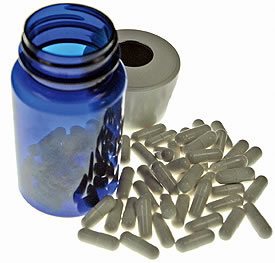 UM researchers recently published new findings in the Archives
of Internal Medicine that suggest a powerful antioxidant could
play a significant role in HIV treatment. They focused their
National Institutes of Health-sponsored study on selenium,
a trace mineral found in the soil that is common to many vegetables
that are part of a healthy diet. UM researchers recently published new findings in the Archives
of Internal Medicine that suggest a powerful antioxidant could
play a significant role in HIV treatment. They focused their
National Institutes of Health-sponsored study on selenium,
a trace mineral found in the soil that is common to many vegetables
that are part of a healthy diet.
Selenium deficiency is a complication
of HIV disease, often leading to an increase in viral virulence,
a decrease in the
body’s
natural killer cells, and a progression of the disease.
Patients with HIV are living much longer, largely as a result
of antiretroviral therapy, but those side effects often lead
to metabolic and cardiovascular problems. And even if patients
adhere to a strict regimen of their medications, complete
control of the virus over time is unlikely.
“Keeping in mind that antiretrovirals are not the complete
answer, the goal of our study was to evaluate the effect of
selenium
supplementation on serum selenium levels in the body and
the subsequent impact on HIV-1 viral load and helper T cell
or CD4
count,” says Barry Hurwitz, Ph.D., professor of psychology
and medicine at the UM Behavioral Medicine Research Center
and lead author of the study.
“This study showed that selenium is a beneficial treatment
that can be used as a safe adjunct therapy in combination with
ongoing
HIV treatments to ensure that the chance of further disease
progression is minimized,” says Hurwitz.
|